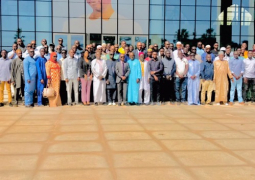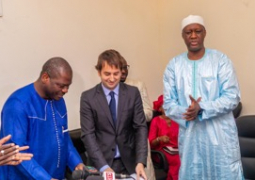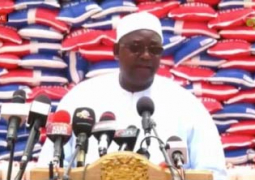
The three-day workshop which is taking place at the German Agency for International Cooperation and Development (GIZ) office was organised by the Ministry of Trade, Industry, Regional Integration and Employment (MOTIE) in partnership with the International Organization for Migration (IOM) The Gambia and the Italian Agency for Development Cooperation.
The inclusive employment training workshop was meant to train and sensitize young people about some opportunities that are available in the country and sub-region.
Sibgha Ajaz, Programme Coordinator of Migration Management Unit at IOM, welcomed the participants to the workshop and disclosed that the outlined topics for the training were extremely exciting.
She said her organisation believed that orderly and regular migration is really a human right as long as it is managed in a proper way, while acknowledging the presence of government officials. He added that their presence was to support the youth in achieving their full potential.
She encouraged them to take and make full use of the workshop to provide themselves with an understanding of how they would get into the labour market.
Faba Jammeh, Director of Employment at the Ministry of Trade, Industry, Regional Integration and Employment (MOTIE), disclosed that the training is one of the preparations they need “because after graduation your journey to the labour market starts.”
He noted that the government through the MOTIE has produced an employment policy to guide everyone, while noting that the policy has two promises that would guide job seekers either as self-employed or employees under someone.
Under these two promises or options, “The first point is when you initiate something for yourself and then see whether you can sustain that. Otherwise, you look at other options – to get employed.”
The Director of Employment expressed their target which includes how many people would be taken out of unemployment to employment status. According to him, the government is creating 150,000 jobs from 2022 to 2026. “Already we are in 2024. Though the biggest challenge on this target is that we've not been able to establish how many jobs have been created so far.”
“But we are happy to announce that GBOS has just conducted what we call the Labour Force Survey, but this is not enough to tell the story of employment creation. But we hope with the support of partners like IOM to ensure that we establish a system that will be able to track on a real-time basis each time you are given an appointment. This will tick in the system to say Mr. X or Madam X has taken up a job. And when you are out or leave the job, it will also tick on the system to say X or Y has also left the job,” he explained.
Nyallow Barrow, Commissioner of Labour at the Department of Labour, commended the organizers for what he described as a great initiative that seeks help the job seekers in the labour market.
He emphasised that the inclusive employment training workshop was purposely designed for the job seekers, returnees, and graduates, while advising them to be attentive and ask necessary questions as much as they could.
He thanked the IOM and partners for funding the programme, noting that it is not the first collaboration. He urged the trainees to take good stock of whatever they have learned at the training.




